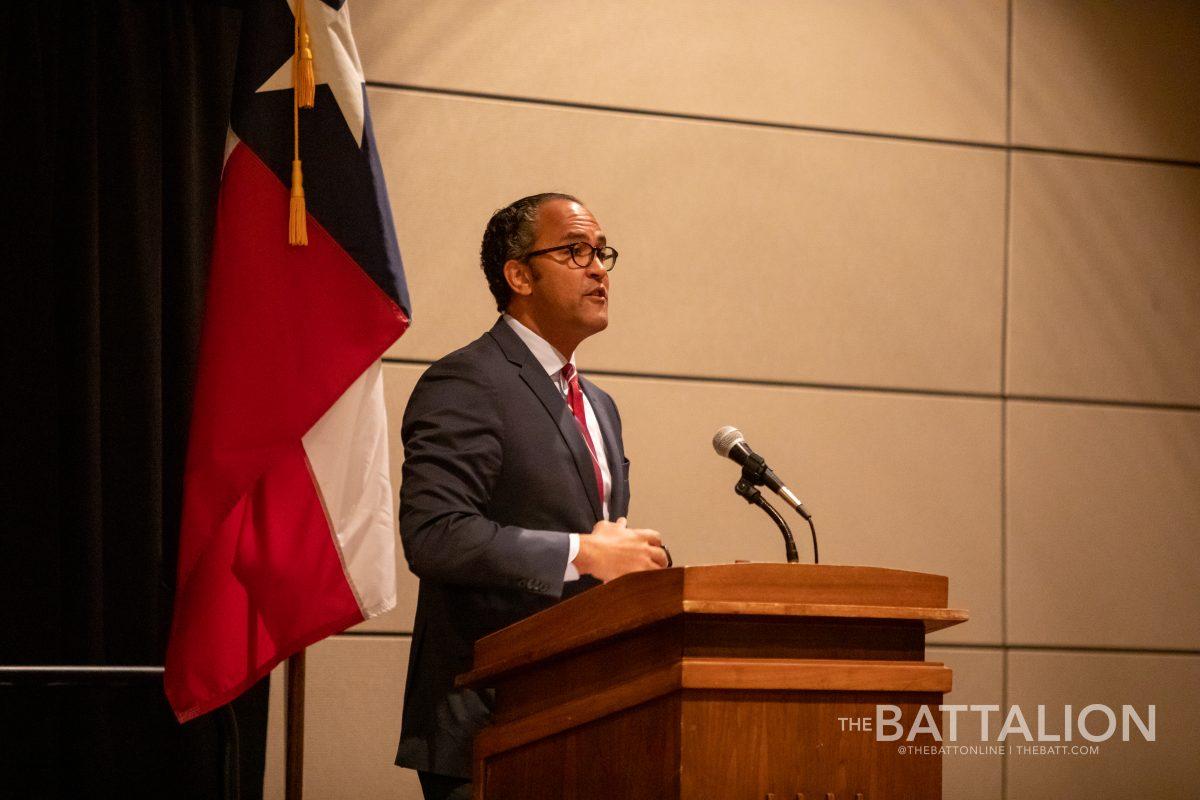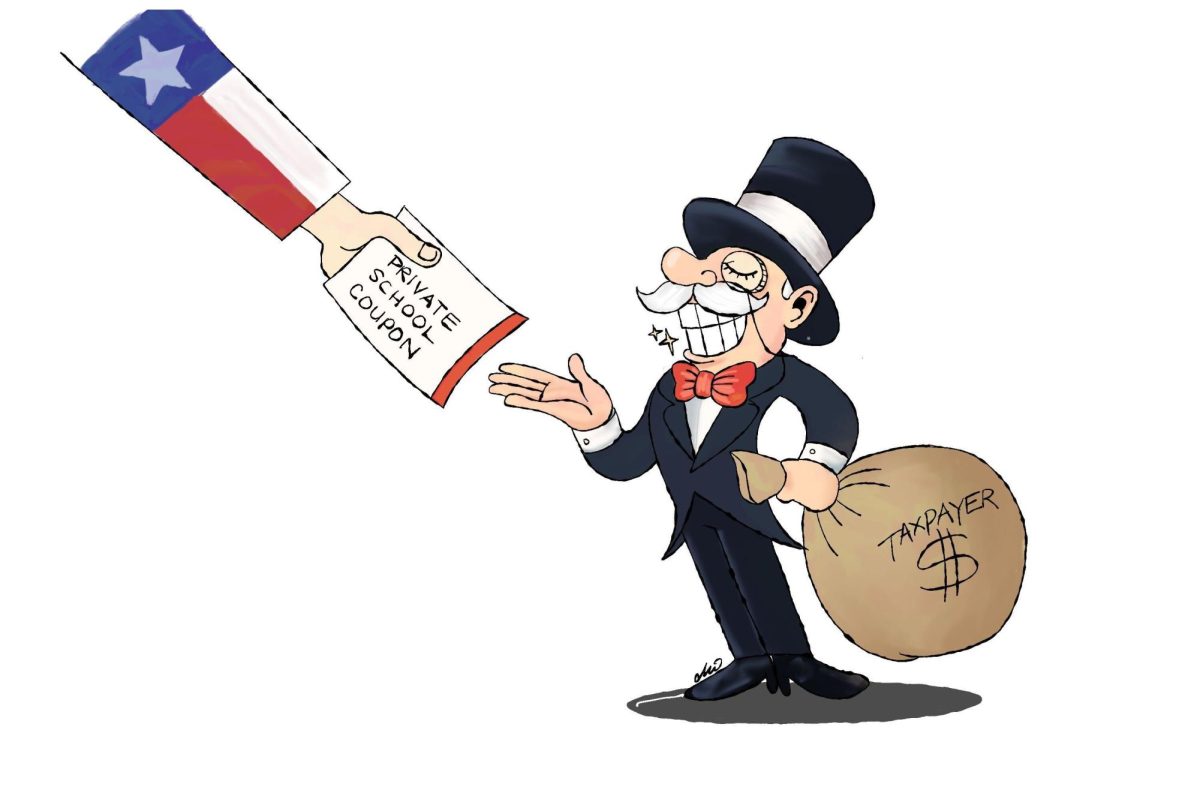America’s role as the dominant military superpower may be coming to an end, but that doesn’t mean its role as a leader should as well. In describing how America’s military intelligence apparatus must adapt to new technologies, former Rep. Will Hurd fails to recognize that we could adapt to live without it.
On Oct. 28, former United States Congressman Will Hurd gave a lecture titled “Getting Big Things Done: Debugging Tech Policy on Texas A&M’s campus.” Terminators, espionage and “a new Cold War” were just a few of the subjects discussed, but represent the overall subject-matter pretty evenly.
Hurd’s lecture described how in the 21st century, advancing technologies are creating new opportunities and risks surrounding intelligent and self-improving artificial intelligence, or AI Future job prospects in an increasingly digital world and the United States’ position as the sole military superpower are also coming into question, Hurd said. In a time where “U.S. military dominance is no longer guaranteed,” we need to take the opportunity to not make the same mistakes of the past and to look at new solutions to avoid conflict.
Instead of trying to grasp at the fleeting memories of victory, we should quit while we’re ahead. The U.S. lost our 20-year war with the Taliban — who had no access to advanced AI or significant interference from their hackers. As Hurd said himself, when something’s not working we need to “reboot it.” And an aggressive American foreign policy has not worked for a long time. Look no further than the military failures from Vietnam to Afghanistan, the trillions of dollars wasted and the almost million dead as a result of conflicts since 9/11 alone.
External threats are not Hurd’s only worry. He and many well-respected scientists believe danger is coming from inside the house in the form of AI Though, there are also many skeptics of an imminent technological singularity — a point where technological development will begin to hyper-accelerate and self-improve — even among AIs themselves.
When asked if it thought AI was a threat to mankind, a chatbot named Cleverbot responded, “Not really.” Cleverbot has nearly surpassed human counterparts in a Turing Test, a method of determining whether an AI can pass off as a human in conversation.
After asking the AI how smart it thinks it could get, it replied, “On a scale of one to 10, I’d say two.”
You heard it here first, folks. AI is self-admittedly not a significant threat to mankind. Unless of course, that’s just what they want us to think.
In 2007, then-Sen. Obama used the phrase “free and open internet” when he campaigned in support of net neutrality. Though Hurd did not spend a great deal of time discussing net neutrality, this same phrase appeared repeatedly throughout the lecture. After the talk, when asked what specific policies or societal changes might allow for a free and open internet, Hurd responded saying the solution is to teach coding in schools and utilize economic incentives against companies misusing their algorithms.
Some experts, however, disagree with Hurd. The Organization for Economic Co-operation and Development education chief has warned against teaching children coding, saying it is a “technique of our times” and it might not always be as useful for securing a job as it is now. Despite the image we all have of the poor factory worker being canned in favor of a giant robot spider leg, automation isn’t only replacing hard labor — even coding is affected.
At the end of the lecture, Hurd recounted his experience with getting refugees to safety in Muzaffarabad, Pakistan after an earthquake killed nearly 90,000 people. The purpose of the example was to demonstrate why the U.S. needed to maintain its global dominance in order to continue to provide support from over 7,000 miles away. However, we don’t need to maintain a military presence to give aid. The U.S. needs to turn over a new leaf and be a leader through good-will, diplomacy and peace with no strings of war or espionage attached.
Instead of prioritizing a reality where “our enemies fear us and our friends love us,” as Hurd said, we should focus our energy into growing our circle of trust. Hurd’s vision is not all that different from the attitudes that dominated politics post 9/11 or even throughout the “first” Cold War. The chief difference is Hurd’s future is prettied up with a shiny coat of silicon.
We live in a rapidly changing world, and to survive, we must change ourselves. Upcoming technological advancements can be a major boon, improving how we can get humanitarian aid to people across the world. Real change would be utilizing the good technology can do for us while addressing the hazards associated with it in order to break our cycle of interventionism and political culture of paranoia. The hawkish vision of America held by Hurd and those in the military-intelligence industry is rooted in the past — to move forward we need new policy and a new approach to foreign affairs, one that is mutually beneficial for all involved.
Zachary Freeman is an anthropology senior and opinion columnist for The Battalion.
















